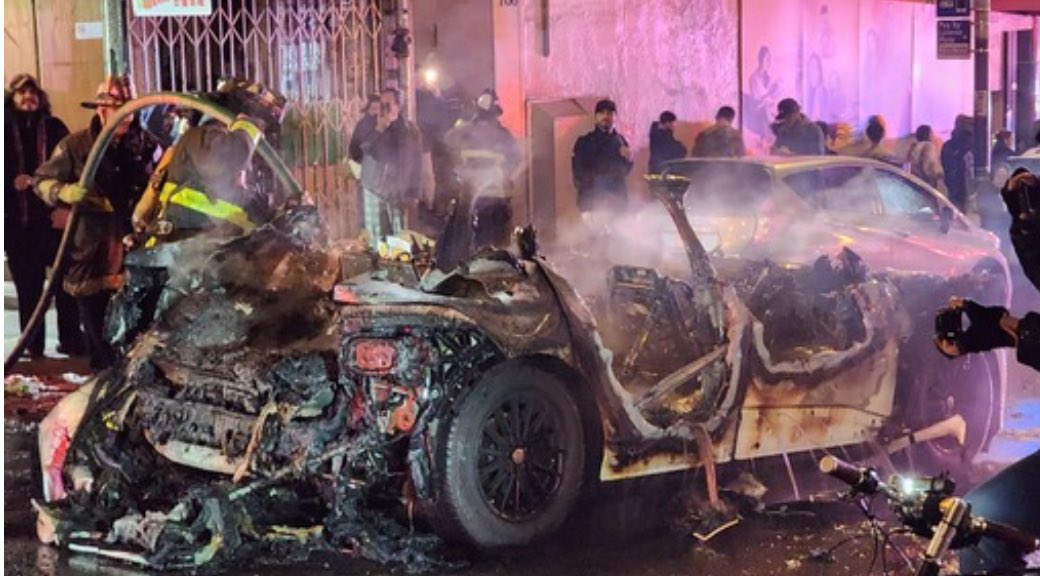Self-Driving Car Torched by Crowd During Lunar New Year Celebration
A Waymo autonomous taxi became the center of an incident during the Lunar New Year celebrations in San Francisco
February 12, 2024
On February 10, a Waymo autonomous taxi became the center of a significant incident during the Lunar New Year celebrations in San Francisco’s Chinatown. The vehicle, operating without a human driver as part of Waymo's driverless taxi service, navigated into the crowded festivities at the intersection of Jackson Street and Grant Avenue. This area, known for being particularly busy during such celebrations, was filled with revelers and blocked on all sides.

Witnesses and reports indicate that the vehicle's presence in the midst of the celebrations led to a hostile reaction from some individuals in the crowd. They attacked the car, eventually setting it on fire. The attack involved surrounding the vehicle, graffitiing it, breaking its windows, and igniting fireworks inside it, which led to the vehicle being reduced to an ashen shell. Videos and social media posts captured the chaotic scene, showing the crowd's actions and the subsequent efforts by firefighters to extinguish the blaze.
Fortunately, there were no injuries reported from this incident, as there were no passengers inside the vehicle at the time. The event has sparked a renewed debate and scrutiny over the role of autonomous vehicles in urban settings, their ability to navigate complex social environments, and the broader implications of their integration into public spaces.
The incident is being investigated by the authorities, while Waymo, the company behind the autonomous vehicle, is said to be working closely with local safety officials in response to the situation.
🎥🔥🧨Raw HD footage: @Waymo vehicle torched in Chinatown --> Holy moly we just got done clipping together this HD footage from tonight for y'all... hope you enjoy (warning: there's a horn for the first few seconds and you're gonna get wet!) #SplashZone https://t.co/5VeWvgPEhe pic.twitter.com/N4ZwIeGjAg
— FriscoLive415 (@friscolive415) February 11, 2024
Waymo is one of the pioneer companies in the development of autonomous vehicle technology. Owned by Alphabet Inc., the parent company of Google. In San Francisco, Waymo offers a self-driving taxi service that allows users to hail rides through an app, similar to traditional ride-sharing services like Uber and Lyft, but with a key difference: the taxis are fully autonomous, operating without a human driver. This service in San Francisco represents one of Waymo's most ambitious real-world applications of its technology. The vehicles are equipped with an array of sensors, cameras, and algorithms that enable them to navigate through city streets, respond to traffic conditions, and ensure passenger safety.
Incidents like this one underscores a critical challenge for companies developing self-driving car technologies: the imperative to foster a positive public perception. This event is not merely an isolated act of vandalism; it is emblematic of the broader societal apprehensions and tensions surrounding the deployment of autonomous vehicles (AVs). As self-driving cars become more common on our streets, their acceptance hinges not just on the technology's sophistication and safety records but also on how well these companies engage with communities, address their concerns, and integrate their innovations in ways that are perceived as beneficial and sensitive.
Important Links
Waymo Vehicle surrounded and then graffiti’d, windows were broken, and firework lit on fire inside the vehicle which ultimately caught the entire vehicle on fire. #SFFD
— SAN FRANCISCO FIRE DEPARTMENT MEDIA (@SFFDPIO) February 11, 2024
Photos by Séraphine Hossenlopp pic.twitter.com/aOTqL3Rk8V

